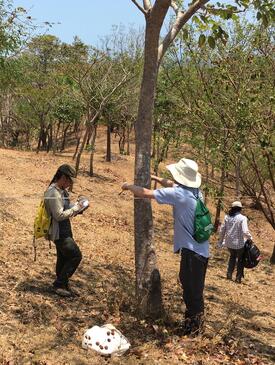Field Course in Tropical Dry Forest Restoration in Human Dominated Landscapes
Summary
Panama has pledged to restore 1 million hectares as part of the Bonn Challenge, an ambitious global effort to restore 350 million hectares of the world’s deforested and degraded land by 2030. To meet their commitment, Panama has prioritized areas for restoration that include highly degraded agricultural lands, many of which are located within the Azuero Peninsula. The Azuero also contains the last remaining patches of tropical dry forest, the most endangered ecosystem in the Neotropics, threated by the dominance of extensive conventional cattle ranching. The destruction of forests has degraded the provision of ecosystem services, which are necessary to support local endemic wildlife and agrarian livelihoods. With an erratic annual rainfall and a dry season lasting from five to six months, the region’s extreme climate variations compound the stresses of unsustainable land-use practices and make efforts to restore the ecosystem particularly challenging. While advances in forest restoration have been shown to recuperate ecosystem services and increase on-farm production, restoration activities require a clear understanding of not only biophysical approaches but also the socio-economic variables and how they influence land use decision making.
This field-based course will be facilitated at ELTI’s Panama Training Landscapes in the Province of Los Santos, which convey ecological principles through its interpretative trail network and demonstration sites. Over a period of six days, students from the Yale School of the Environment (YSE) will learn from ELTI team members and local landowners about the ecology of tropical dry forests, how and why these ecosystems have been modified over time, and the distinct historical, cultural, and socio-economic factors that shape and influence land management practices in the region. Students will also visit a network of field sites that showcase a range of forest restoration and sustainable cattle ranching strategies that landholders are adopting in the region with support from ELTI’s Training and Leadership programs. Particular attention will be given to tropical dry forest ecology, how to quantify ecosystem services in different sites and the range of restoration strategies that are utilized by different landowners. During the course students will have ample opportunity to conduct different activities, group exercises and open discussions. Students will also be able to talk with farmers about their land management challenges and ELTI team members about their capacity development strategies and interventions.
This course will be offered by invitation only.
Content
Day 1: Welcome and orientation to course
Day 2: Dry tropical forest ecology and ecosystem services
Day 3: Deforestation, degradation and the effects on the integrity of ecosystem services
Day 4: Forest restoration strategies for tropical dry mosaic landscapes
Day 5: Agroforestry and silvopastoral systems
Day 6: Capstone project


